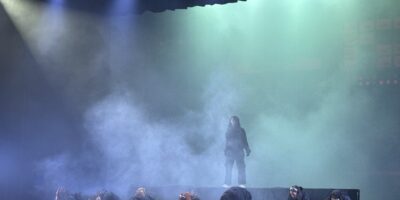On November 18th, 2017 the University of Waterloo hosted the 3rd annual Waterloo Nanotechnology Conference (WNC, formerly known as WUNC). Hundreds of people across academia, industry, and startup environments joined together at the Quantum Nano Centre to explain their ideas and explore new areas of nanotechnology research. WNC strives to “explore what it means to make the best of this revolutionary era of new discoveries, new technologies, and exciting new possibilities.”
The day began with some opening remarks and breakfast, with the conference chair Jatin Patil delivering his thoughts about the organization of the conference and the importance of nanotechnology to us. The Dean of Science, Dr. Robert Lemieux, as well as Associate Dean, Research (Engineering), Dr. Anwar Hasan, also provided their thoughts on the conference and Waterloo. The Honorable Bardish Chagger, Minister of Small Business and Tourism, Leader of the Government in the House of Commons, and Member of Parliament for Waterloo, also gave her opening words and recognised Waterloo’s diversity in research. With that, they opened the floor to the first distinguished speaker: Dr. Duncan Stewart.
Dr. Stewart is the General Manager, Security & Disruptive Technologies at the National Research Council, and has been since 2008. He completed his Ph.D. at Stanford University, and worked at Hewlett-Packard for 10 years afterwards in Palo Alto, California. Facilitating the fireside chat was Akshayaa Govindan, Logistics Director of WNC. She asked questions to Dr. Stewart, and audience members were also allowed to submit their queries through Facebook and Twitter. One piece of advice that Dr. Stewart mentioned was to travel the world while you still could. In between his education and work he traveled quite a bit and claimed it helped him in his life. This is a grand opportunity we get through our coop system so be sure to take full advantage of it. Speaking of coops, he hires them, so if you happen to be reading this and are interested in research be sure to give the National Research Council of Canada a call, and maybe you’ll find a position that suits you. Another piece of advice that he gave was that you can change the world, start your startup, AND make good money. They’re all possible and with enough passion and work you can achieve it.
After the chat, an Industry Panel was held with some of the industry’s top members. The panel included Dr. Rina Carlini, President and CEO of Haltech Innovation, Dan Sinai, Senior Executive at Innovation IBM Canada, Dr. Melanie Ledgerwood, R&D Manager of Teledyne DALSA, and Dr. ArminFischer, COO of QD Solar. The panel was chaired by Dr. Illan Kramer, Director for Corporate, Government, and International Partnerships at UofT. More questions were asked about their industry experiences, as well as their journey to get to their current positions. Dr. Carlini, Dr. Kramer, Mr. Sinai, and Dr. Ledgerwood were all graduates of UW! And they’ve all incorporated nanotechnology into their roles and research. Like Dr. Stewart, they encouraged students to travel and take on opportunities, as we would be the ones who would change the world. It was really inspiring to hear this from a professional panel as a 2nd year NE student, as I felt my work could soon be making an impact on Canadian society, or even the world.
Lunch came after, along with a poster and breakout session. Industry workers along with researchers presented their posters during this session and got to network with students and show off their technologies. SLIPS, Opalux, and Validere were some industry members just to name a few, and tons of research from UofT, UW, and other topics were showcased during the poster session. Congratulations to Paul Chen for winning the $300 prize for best poster based on his research for gold nanoparticles! I got a lot of chances to meet with people, and collect business cards in order to network. These panelists were very open to speaking with students and like the others who already presented, offered great advice to all types of people; entrepreneurs, researchers, or combinations of both, so everyone gained something from their conversations.
The afternoon keynote was presented by Dr. Joanna Aizenberg, a professor at Harvard University. Some of you may recognize this name, as she has hired over 40 UW coops over the last 6 years. Her research is inspired by nature’s ability to solve complex problems and self-assemble functional materials. She joined Bell Labs in 1998 and made pioneering contributions before joining Harvard in 2007. Her presentation showcased a lot of the research she has done, and even featured some of the work done by UW students. In fact, she said there’s “something about Waterloo students; something about having a deadline, and not worrying about homework, that makes you great researchers. In fact, don’t tell them, but UW students are better than Harvard students!” This was incredibly honourable to hear from someone whose research inspires so many, and the fact that she gives back to the UW community made her extremely likable by the audience.
After the keynote there were breakout sessions, split by research and industry. Unfortunately, I stayed for all the industry ones, so I was not able to get the full details on the research topics, but I was still able to gauge what research they did based on the pamphlet handouts provided at the conference. The first researcher presenting at the breakout session was Dr. Farnaz Niroui, Miller Postdoctoral Fellow at UC Berkley. Dr. Niroui is a NE 2011 graduate, and completed her Ph.D. at MIT in 2017, and will be returning there as an Assistant Professor in Electrical Engineering in 2018. Her research lies at the interface of device physics, nanofabrication, and materials science to engineer unique nanoscale devices. The next researcher was another NE grad, from 2014, Madelaine Liddy, a Ph.D. student at the Institute for Quantum Computing. She works with David Cory’s group focusing on developing diamond-based quantum sensors. Finally, Dr. Alex Chortos, a Postdoctoral Fellow at Harvard University, is a 2011 NE graduate with a Ph.D. from Stanford University. He currently works with the Wyss Institute of Harvard University to develop materials and devices for biomimetics and electronics.
The industry breakout sessions were based primarily on entrepreneurs and smaller startups. Shakir Lakhani, Co-founder and CTO of Avro Life Sciences, is a 2020 NE student who has held several coop positions at small companies such as Validere and H2NanO, and has publications in journals such as Nature Materials. Currently he’s working on his own startup, an allergy patch to phase out obsolete methods of allergy testing. Matthew Mulvale, a 2015 NE graduate, joined Opalux Inc. as a research scientist, leading the development of one of Opalux’s photonic-nanocrystal based security features. He is working on putting this technology use to security on stuff like bank notes and passports. Finally, Perry Everett, Co-founder and CEO of Arylla Inc., is a 2014 NE graduate, where he created the company after his fourth-year design project. Now, Arylla has won numerous awards and earned backing from world-class investors like Y Combinator and Zappos for their secure ink, which they put on luxury goods to prevent counterfeit.
At the end of the day, closing remarks were given by Dr. Sushanta Mitra, Executive Director of WIN, commemorating everybody’s progress in nanotechnology and how we, as students, can change the future on the nano scale. Special thanks were also extended to many people, like Caroline Brookes, Jenn Coggan, Mayuran S., and plenty of others who helped organize the conference, including the wonderful volunteer team. Overall the conference was my second time attending, and once again it was a 10/10 experience. It was a great way to make connections and see the cutting-edge technology of our generation. I highly encourage anyone who’s even remotely interested in nanotechnology to attend this conference, as you could be inspired to make the next big thing (or should I say, small).




Leave a Reply